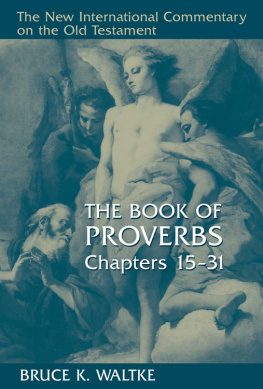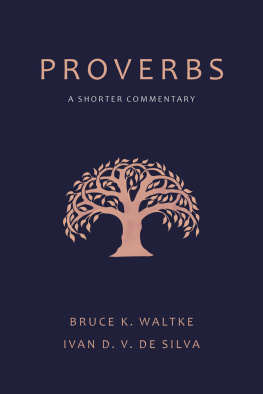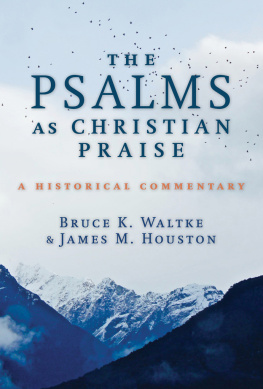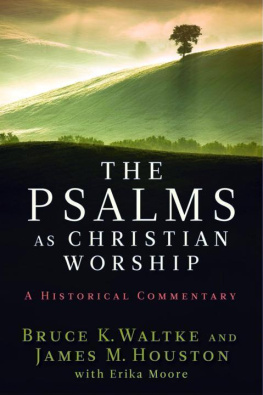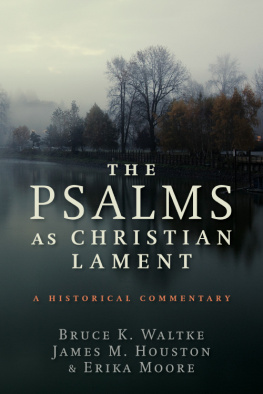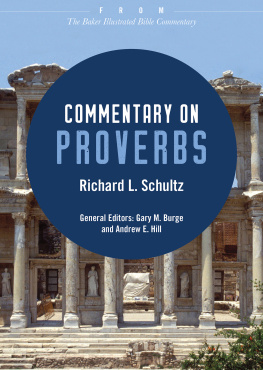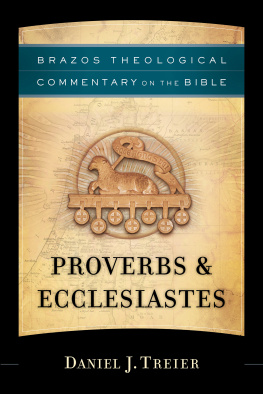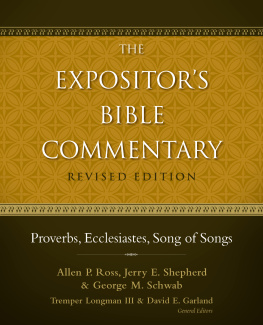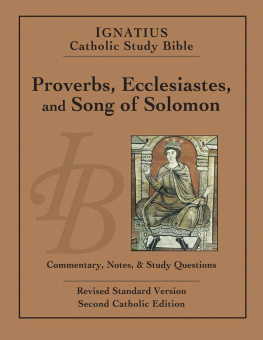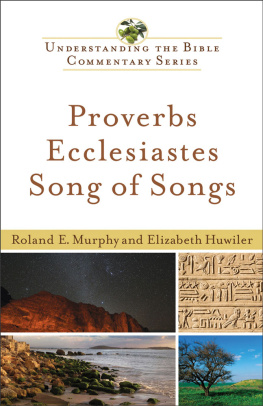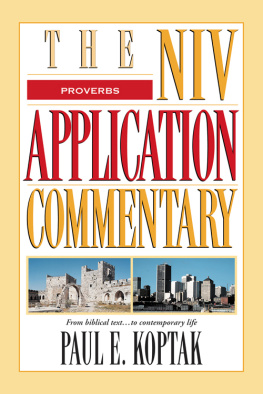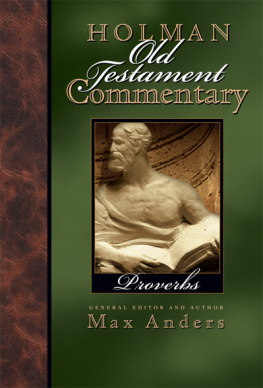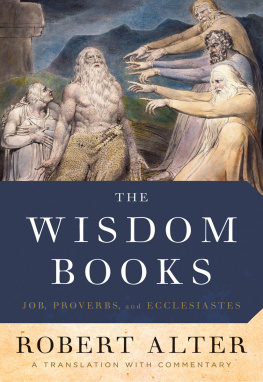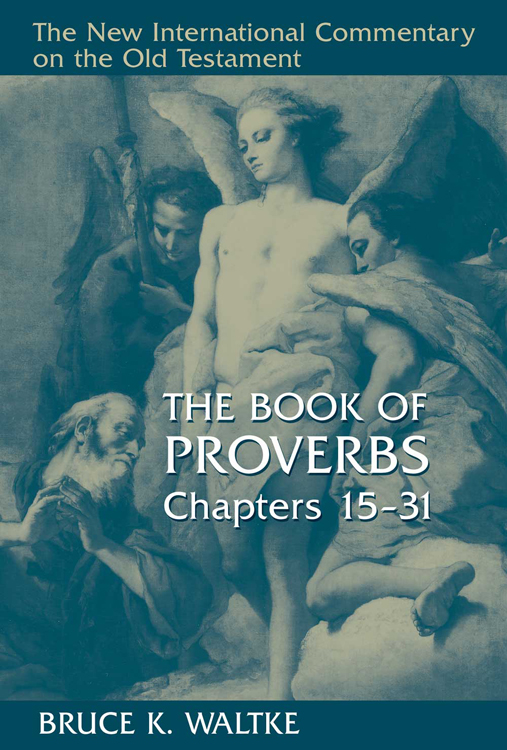
The Book of
PROVERBS
Chapters 1531
BRUCE K. WALTKE
W ILLIAM B . E ERDMANS P UBLISHING C OMPANY
G RAND R APIDS, M ICHIGAN / C AMBRIDGE, U . K .
Publishers Note
This commentary was planned and written as a single volume, but its length dictated the need to publish it in two volumes. The reader should note that the Introduction in the first volume covers the entire book of Proverbs; this second volume comprises only commentary on Proverbs 15:3031:31.
For the readers convenience, each volume has its own table of contents, abbreviation list, and indexes.
2005 Wm. B. Eerdmans Publishing Co.
All rights reserved
Wm. B. Eerdmans Publishing Co.
2140 Oak Industrial Drive N.E., Grand Rapids, Michigan 49505 /
P.O. Box 163, Cambridge CB3 9PU U.K.
Library of Congress Cataloging-in-Publication Data
The book of Proverbs: chapters 1531 / Bruce K. Waltke.
p. cm. (The New international commentary on the Old Testament)
Includes bibliographical references and .
eISBN 978-1-4674-2455-4
ISBN 0-8028-2776-4
1. Bible. O.T. Proverbs XVXXXICommentaries.
I. Title. II. Series.
BS1465.53.W36 2004
223.7077dc22
2004050609
www.eerdmans.com
Dedicated to
Elaine,
my competent wife,
worthy of praise in the gate
CONTENTS
COMMENTARY
INDEXES
Long ago St. Paul wrote: I planted, Apollos watered, but God gave the growth (1 Cor. 3:6, ). He was right: ministry indeed requires a team effortthe collective labors of many skilled hands and minds. Someone digs up the dirt and drops in seed, while others water the ground to nourish seedlings to growth. The same team effort over time has brought this commentary series to its position of prominence today. Professor E. J. Young planted it forty years ago, enlisting its first contributors and himself writing its first published volume. Professor R. K. Harrison watered it, signing on other scholars and wisely editing everyones finished products. As General Editor, I now tend their planting, and, true to Pauls words, through four decades God has indeed graciously [given] the growth.
Today the New International Commentary on the Old Testament enjoys a wide readership of scholars, priests, pastors, rabbis, and other serious Bible students. Thousands of readers across the religious spectrum and in countless countries consult its volumes in their ongoing preaching, teaching, and research. They warmly welcome the publication of each new volume and eagerly await its eventual transformation from an emerging series into a complete commentary set. But as humanity experiences a new century of history, an era commonly called postmodern, what kind of commentary series is NICOT? What distinguishes it from other similarly well-established series?
Its volumes aim to publish biblical scholarship of the highest quality. Each contributor writes as an expert, both in the biblical text itself and in the relevant scholarly literature, and each commentary conveys the results of wide reading and careful, mature reflection. Ultimately, its spirit is eclectic, each contributor gleaning interpretive insights from any useful source, whatever its religious or philosophical viewpoint, and integrating them into his or her interpretation of a biblical book. The series draws on recent methodological innovations in biblical scholarship, for example, canon criticism, the so-called new literary criticism, reader-response theories, and sensitivity to gender-based and ethnic readings. NICOT volumes also aim to be irenic in tone, summarizing and critiquing influential views with fairness while defending their own. Its list of contributors includes male and female scholars from a number of Christian faith-groups. The diversity of contributors and their freedom to draw on all relevant methodologies give the entire series an exciting and enriching variety.
What truly distinguishes this series, however, is that it speaks from within that interpretive tradition known as evangelicalism. Evangelicalism is an informal movement within Protestantism that cuts across traditional denominational lines. Its heart and soul is the conviction that the Bible is Gods inspired Word, written by gifted human writers, through which God calls humanity to enjoy a loving personal relationship with its Creator and Savior. True to that tradition, NICOT volumes do not treat the Old Testament as just an ancient literary artifact on a par with the Iliad or Gilgamesh. They are not literary autopsies of ancient parchment cadavers but rigorous, reverent wrestlings with wonderfully human writings through which the living God speaks his powerful Word. NICOT delicately balances criticism (i.e., the use of standard critical methodologies) with humble respect, admiration, and even affection for the biblical text. As an evangelical commentary, it pays particular attention to the texts literary features, theological themes, and implications for the life of faith today.
Ultimately, NICOT aims to serve women and men of faith who desire to hear Gods voice afresh through the Old Testament. With gratitude to God for two marvelous giftsthe Scriptures themselves and keen-minded scholars to explain their messageI welcome readers of all kinds to savor the good fruit of this series.
R OBERT L . H UBBARD J R.
In a world bombarded by inane cliches, trivial catchwords, and godless sound bites, the expression of true wisdom is in short supply today. The church stands alone as the receptacle and repository of the inspired traditions that carry a mandate for a holy life from ancient sages, the greatest of whom was Solomon, and from the greater than Solomon, Jesus Christ. As the course and bulk of biblical wisdom, the book of Proverbs remains the model of curriculum for humanity to learn how to live under God and before humankind. As a result, it beckons the church to diligent study and application. To uncommitted youth it serves as a stumbling stone, and to committed youth a foundation stone.
But, tragically, the church has practically discarded the book of Proverbs, which was written for young people as a compass by which to steer their ship of life (see 1:26). Of its 930 ancient sayings many Christians know threeto fear the LORD (1:7), to trust him (3:56), and to train their children in the way they should go (22:6)and possibly something about the virtuous wife (31:1031). However, to fear the LORD is misunderstood, to trust him (3:5) is a platitude divorced from the book, the promise that the child will not depart from childhood rearing raises more questions than solutions, and the poem about the virtuous wife seems out of date.
For some honest readers, as one student confessed, Proverbs seems banal or wrong. Obviously a truthful witness gives honest testimony (12:17), does not deceive (14:5), and gives the LORD delight (12:22). For sober theologians the books heavenly promises of health, wealth, and prosperity are troublesome, and for many saints they seem detached from earths harsh realities. Some proverbs contradict each other: Answer a fool according to his folly (26:4) is followed by Dont answer a fool according to his folly (26:5). Moreover, whereas Proverbs affirms a righteous order, Job (9:22) and Ecclesiastes (9:2) deny its reality.
For the logical mind the book seems to be a hodgepodge collection, having no rhyme or reason in its grouping of sayings. They jump from one topic to another like scatterbrains in a living-room conversation. How does one preach and teach such a mishmash?
For the modern mind, the books cultural setting seems far removed from the twenty-first century. Proverbs puts a high priority on tradition and age, while the modern mind prizes change and youth. Proverbs admonishes parents not to spare the rod, but the states welfare workers want to jail those who obey it. Its psychology is psychosomatic; modern psychology uses more scientific terms.
Next page
